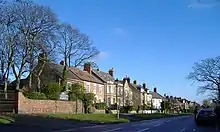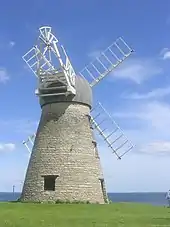Whitburn, Tyne and Wear
Whitburn is a village in South Tyneside, on the coast of North East England. It lies within the metropolitan borough of South Tyneside, roughly halfway between South Shields and Sunderland, in the ceremonial county of Tyne and Wear. Historically part of County Durham, the village has a population of 5,235.[1]

Etymology
The origin of the name is not entirely clear. While the "Whit" component almost certainly derives from the Old English word hwit meaning "white", the origin of the "burn" component is disputed. It may come from the Northern English term burn meaning a stream, or it may be a corruption of "barn". A record of the name as Wituberne in 1182 adds little clarity.
A brief history
Whitburn is listed in the "Boldon buke" of 1183 as "Whitbern" and was probably an Anglo-Saxon settlement.
Following the attack of the Spanish Armada on England in 1588, the vanquished Spanish fleet fled up the east coasts of England and Scotland. Two Spanish galleons ran aground on Whitburn Rocks in rough seas and local inhabitants plundered the wreckage. The bell from one of the galleons was placed in Whitburn Church. Spanish oak beams removed from the shipwrecks could still be viewed in the roof of the Whitburn lawnmower shop in the 1950s prior to the building's demolition.
Whitburn remained fairly undisturbed settlement until 1718 when the Land Enclosure Act came into force and a number of farms were created. The settlement was isolated as no roads connected to it, but there was a path on Sea Lane (now East Street) connecting it to Whitburn Bents, a nearby hamlet. Not until 1866 was a road built over the sandunes to Fulwell, in northern Sunderland. In 1874 Marsden Pit was sunk and the community increased dramatically as a result. Whitburn Colliery closed in 1968, and the land is now a coastal park and nature reserve.[2]
Features
Whitburn has retained its village character, with its main street, parish church, cricket ground and park with bowling greens and tennis courts.
It is generally accepted that Lewis Carroll wrote The Walrus and the Carpenter while holidaying at his cousins' house in Whitburn.[3] A statue of Carroll is in the library.[4]

Whitburn windmill, dating from the 18th century, is a local landmark.[5] Durham County Council, which covered the South Tyneside area until 1974, took ownership of the mill in 1960 from the Church Commissioners. The building is listed (Grade II) as it is considered to be of special architectural and historical importance and is protected therefore by the requirements of the Planning (Listed Building and Conservation Areas) Act 1990. In 1991/1992 South Tyneside Council undertook a restoration project of the mill, including restoration of the sails, for which it was awarded the Civic Trust Award.
There are three schools in Whitburn – Whitburn Village Primary School, Marsden Primary School and Whitburn Church of England Academy (formerly Whitburn Comprehensive School).
To the north of the village, near Marsden village, is Whitburn Coastal Park, near which is cared for by the National Trust team based at the Souter Lighthouse. This recreation area is a popular haunt for birdwatchers. A sea-watching observatory is used mainly by Durham Bird Club members, who monitor seabird and wildfowl migration throughout the year (activity peaks during July–November), but is open to all bird-watchers. Keys (£12) can be bought at the National Trust shop at Souter Lighthouse but the observatory is normally in use whenever seabird and wildfowl passage is in progress which means it can be accessed by bird-watchers without keys. Whitburn is one of the premier sites on the east coast of England for seawatching with notable list of rarities to its name. A good variety of cetaceans are also seen from here, particularly in late summer.
There were three public houses in Whitburn. The Grey Horse (now closed) on North Guards, the Jolly Sailor on Front Street and the Whitburn Lodge (closed) on the Coast Road which used to be part of the former Whitburn Colliery buildings.
People from Whitburn
Famous people to come from Whitburn, such as:
- George Farrow – footballer, member of Blackpool's 1953 FA Cup-winning side.
- Jack Weddle – footballer, striker for Portsmouth and Blackburn Rovers.
- Bill Robinson – footballer, striker for Sunderland, member of Charlton Athletic's 1947 FA Cup-winning side, and West Ham United.
- Edward Brown – footballer for Lincoln City was born in Whitburn.
- John Hastings – footballer for Rotherham United and Barrow born in Whitburn 1903 – died in Whitburn October 1966.
- Jack Young and Billy Henderson (footballers), both full-backs played for West Ham United in the 1923 FA Cup Final.[6]
- Nadine Shah – musician
- Keith Waugh – professional football goalkeeper with Sunderland, Peterborough United, Sheffield United, Bristol City, Coventry City and Watford between 1973 and 1994 lived and grew up in Whitburn and attended both the infants and junior schools.
- Julie Elliott – Labour Party MP for Sunderland Central – born in Whitburn 1969.
- Tony C. Smith – podcaster, creator of StarShipSofa, the first podcast to win a Hugo Award.
- Jimmy Seed – footballer, striker for Tottenham Hotspur where he won the F.A.Cup in 1921, manager of Charlton Athletic's 1947 FA Cup-winning side, Sheffield Wednesday who won the League twice with him as captain, and England who he played for five times.
References
- Office for National Statistics : Census 2001 : Urban Areas : Table KS01 : Usual Resident Population Archived 8 February 2007 at the Wayback Machine Retrieved 26 August 2009
- Whitburn Archived 30 September 2007 at the Wayback Machine
- BBC – Wear – Coast – Point 7 – The Carroll connection
- British Society for the History of Mathematics
- Historic England. "WHITBURN MILL, CEDAR GROVE (east side), BOLDON, SOUTH TYNESIDE, TYNE AND WEAR (1355075)". National Heritage List for England. Retrieved 21 May 2009.
- 1923 Cup Final programme
External links
| Wikimedia Commons has media related to Whitburn, Tyne and Wear. |
- South Tyneside Council & Community website – Local council website
- Whitburn at A Vision of Britain through Time
- History of Mining at Whitburn from the Durham Mining Museum
- Map sources for Whitburn, Tyne and Wear
- Photographs of Whitburn, old and new from the Whitburn Local History Group
- Local Youth Football in Whitburn & Cleadon
- Whitburn Community Website